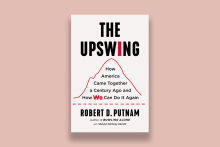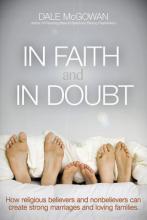Robert D. Putnam

IN THIS TIME of pandemic and sheltering in place, we all feel the need for community. We self-isolate to guard the health of ourselves and our friends—shunning our neighbors is, paradoxically, loving them. This cultural conundrum suits our individualistic age, and the story of how we came to this rampant individualism is told in The Upswing: How America Came Together a Century Ago and How We Can Do It Again, by Robert D. Putnam and Shaylyn Romney Garrett.
Putnam made his name 20 years ago with Bowling Alone, diagnosing America’s shrinking sense of community since the ’60s. He propagated the concept of “social capital” to name the value of our connections, to quantify our losses. Now, in The Upswing, he takes the story back further and speaks in simpler terms of “I” and “we.”

If interfaith marriages are supposedly doomed, Dale McGowan’s should have been toe-tagged from the start.
He’s a committed atheist; his wife comes from a line of Southern Baptist preachers. Yet 23 years and three kids later, they are still happily married.
“The key is to talk about your values,” McGowan said from his home in Atlanta. “A lot of time we mix up the words ‘values’ and ‘beliefs.’ Beliefs are what you think is true about the universe. Is there a God? Where do we go when we die? But values are what you believe are important and good. When you get couples talking about values they find out they share a tremendous amount, even if they don’t share beliefs.”
That’s what McGowan and his wife, Becca, did. While she believed in one God, she did not believe salvation could be had only through belief in Jesus. And he agreed that he could go to church with her — and did, for many years, with their children.